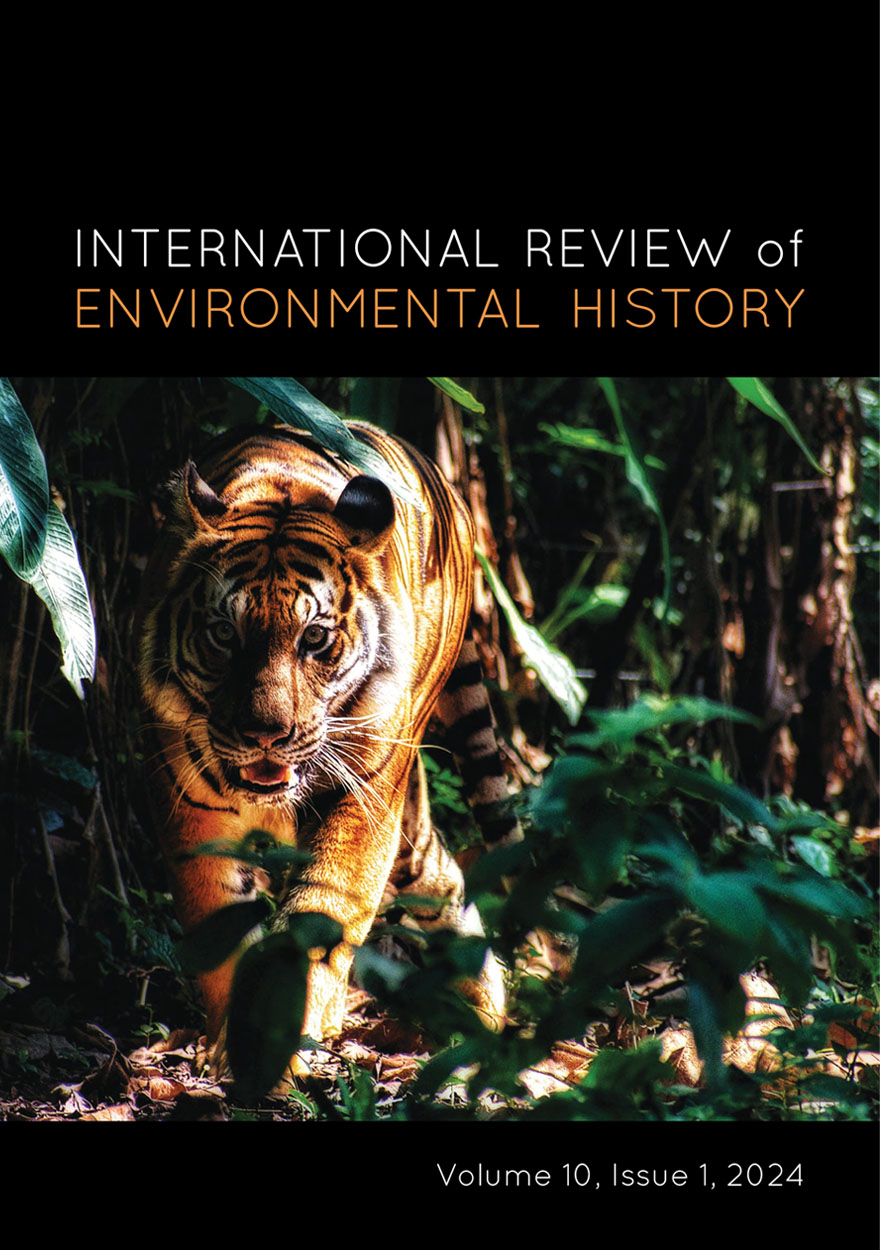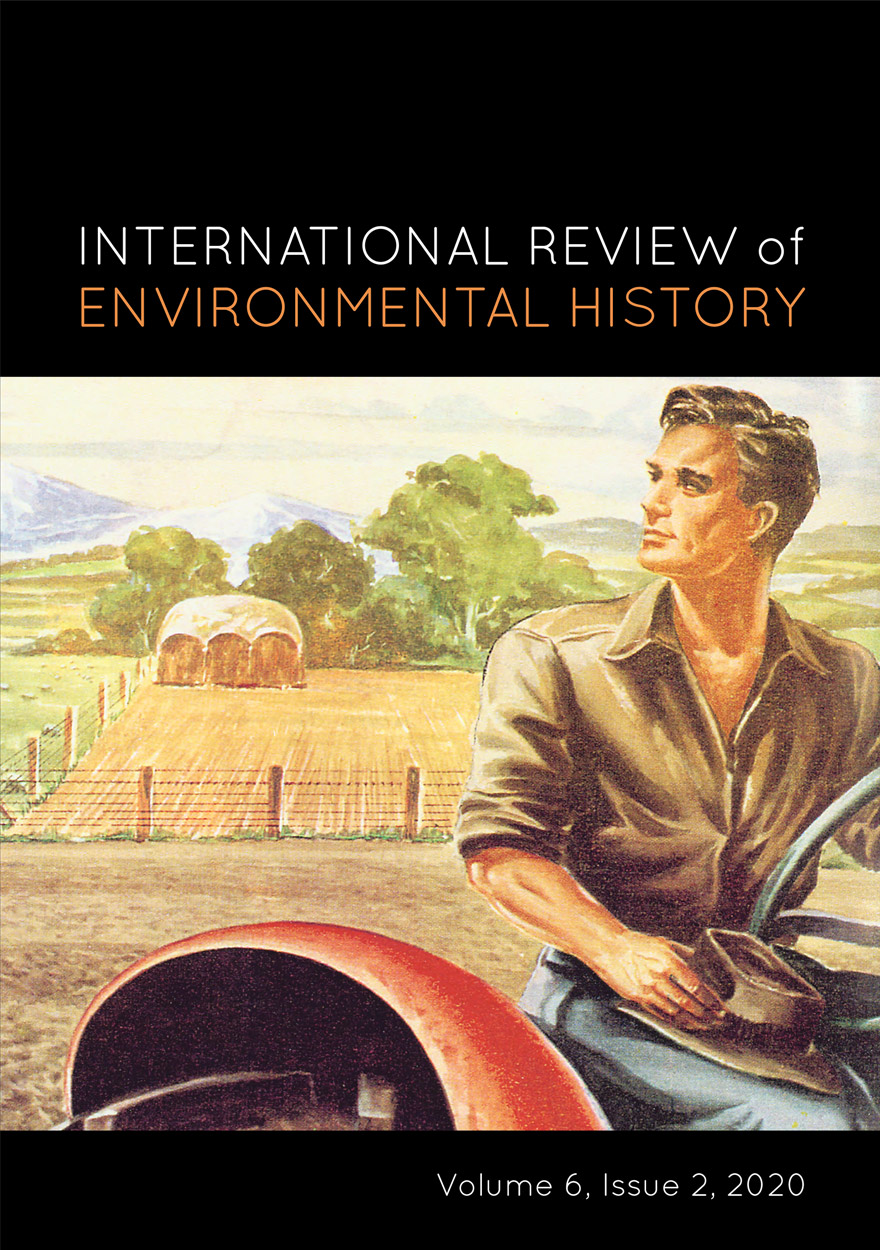Search titles
Displaying results 1 to 10 of 92.

International Review of Environmental History: Volume 10, Issue 2, 2025 »
Edited by: James Beattie, Ruth Morgan
Publication date: 2025
This latest issue of the International Review of Environmental History takes readers from the settler landscapes of nineteenth-century Aotearoa New Zealand to the post-1945 rise of herbicides in Northern Europe. Lingering in Aotearoa, readers will be immersed in geological debates about the causes of past glaciation and trace the early twentieth-century appeal of the Phoenix palm. This issue also features a personal reflection on the campaign to protect K’gari-Fraser Island in the mid-1970s and its lasting influence on Australian environmental law. Together, these contributions reveal the spread and influence of transnational ideas on local understandings of environmental change and conservation.
Coming soon
Notify me
Dregs »
Love and Monsters in Small Town New Zealand
Authored by: Laura McLauchlan
Publication date: March 2025
Girls who join dog packs, boys who gain strength from trees, men who love bodies with nobody in them: Dregs is a collection of tenderly monstrous love stories, set in a shadowy small town of the same name. Based in South Canterbury, New Zealand, these lovingly disturbing fictions welcome the strange and other-worldly, while keeping an ethnographic eye trained on the classed, religious, gendered, racialised and species-based forces shaping this rural region of New Zealand's South Island.
While at times grotesque, these darkly loving, richly illustrated tales offer new avenues for ethnographic research and shed new light on the region, giving voice and form to unspoken aspects of this antipodean rural idyll. Shaped by a deep respect for the monstrous feminine, regardless of the gender of the bodies in which such forces appear, Dregs: Love and Monsters in Small Town New Zealand is a product of both an anthropological sensibility and a trust that naming and finding ways to live well with our monsters is a vital aspect of living well in our times.

International Review of Environmental History: Volume 10, Issue 1, 2024 »
Edited by: James Beattie, Ruth Morgan
Publication date: October 2024
This latest issue of the International Review of Environmental History takes readers from tiger hunts in sixteenth-century India to the rise of organic foods across the Anglosphere by the late 1970s. Along the way, readers will encounter the ways that Cantonese migrants interpreted the environments of Aotearoa New Zealand at the turn of the twentieth century, and the influence of environmentalism in the US trade union movement during the 1960s. This issue also features a forum on a growing area of interest for environmental historians and allied practitioners, the history of emotions in response to environmental change. Here, scholars outline an historiography of ecological anxiety and reflect on the role of emotions in their historical practice at a time of planetary crisis. Despite the diverse settings and topics of the papers herein, together the collection reveals the enduring impacts of how different societies have understood and shaped the more-than-human world.

A Team of Five Million? »
The 2020 ‘Covid-19’ New Zealand General Election
Publication date: June 2024
New Zealand was one of a handful of countries that held a national election in the midst of the Covid-19 pandemic. Its policy response stood out as remarkably successful. Indeed, several years on from the onset of the crisis, in 2023 New Zealand still retained a record of no excess deaths. While New Zealanders were voting on October 17, 2020, their country had only recorded 25 confirmed deaths out of a population of five million. Then, support for the government’s crisis management was at its height. Labour, the leading party in the incumbent coalition government, secured a historic election victory. Prime Minister Jacinda Ardern had taken up the metaphor of the New Zealand people as ‘a team of five million’ facing the Covid-19 threat together. This book seeks to explain the success of the government’s strategy through an analysis of the election campaign and outcome. The authors also address the limits of this approach and the extent to which some voters felt alienated rather than connected with the ‘team’. The election outcome was a big short-term swing of the electoral pendulum. It did not generate a reset of the party system. Three years on, as the 2023 election loomed into sight, the party system looked much as it did prior to the pandemic, and Labour’s success in 2020 was about to be dramatically reversed.

Adapting for Inertia »
Delivering Large Government ICT Projects in Australia and New Zealand
Authored by: Grant Douglas
Publication date: October 2023
Despite much learning and research over many decades, large ICT software projects have continued to experience poor outcomes or fallen short of original expectations—some spectacularly so. This is the case in the Australian and New Zealand public sectors, even though these projects operate within historically developed institutional frameworks that provide the rules, guidelines and controls, and aim to consistently improve outcomes.
Something is amiss. In Adapting for Inertia, Grant Douglas questions the effectiveness of these institutional frameworks in governing large ICT software projects in the Australian and New Zealand public sectors. He also gauges the perspectives of a large number of actors in projects in both sectors and examines two case studies in detail.
The main narrative to emerge is that the institutional frameworks are in a state of inertia: they are failing to adapt, owing to various institutional factors—all of which have public policy implications. Sadly, Douglas finds, this inertia is likely to continue. If there is difficulty in changing the capacity to govern, he proposes, policymakers should look to change the nature of what is to be governed.

Mobilising the Masses »
Populist Conservative Movements in Australia and New Zealand During the Great Depression
Authored by: Matthew Cunningham
Publication date: April 2022
The radical right has gained considerable ground in the twenty-first century. From Brexit to Bolsonaro and Tea Partiers to Trump, many of these diverse manifestations of right-wing populism share a desire to co‑opt or supplant the mainstream parties that have traditionally held sway over the centre right. It is now more important than ever to understand similar moments in Australian and New Zealand history.
This book concerns one such moment—the Great Depression—and the explosion of large, populist conservative groups that accompanied the crisis. These ‘citizens’ movements’, as they described themselves, sprang into being virtually overnight and amassed a combined membership in the hundreds of thousands. They staunchly opposed party politicians and political parties for their supposed inaction and infighting. Whether left or right, it did not matter. They wanted to use their vast numbers to pressure their governments into enacting proposals they believed were in the national interest: a smaller, more streamlined government where Members of Parliament were free to act according to their conscience rather than their party allegiance. At the same time, the movements prescribed antidotes for their nations’ economic ill‑health that were often radical and occasionally anti-democratic.
At the height of their power, they threatened to disrupt or outright replace the centre right political parties of the time—particularly in Australia. At a time when fascism and right-wing authoritarianism were on the march internationally, the future shape of conservative politics was at stake.

Archaeological Perspectives on Conflict and Warfare in Australia and the Pacific »
Edited by: Geoffrey Clark, Mirani Litster
Publication date: March 2022
When James Boswell famously lamented the irrationality of war in 1777, he noted the universality of conflict across history and across space – even reaching what he described as the gentle and benign southern ocean nations. This volume discusses archaeological evidence of conflict from those southern oceans, from Palau and Guam, to Australia, Vanuatu and Tonga, the Marquesas, Easter Island and New Zealand. The evidence for conflict and warfare encompasses defensive earthworks on Palau, fortifications on Tonga, and intricate pa sites in New Zealand. It reports evidence of reciprocal sacrifice to appease deities in several island nations, and skirmishes and smaller scale conflicts, including in Easter Island. This volume traces aspects of colonial-era conflict in Australia and frontier battles in Vanuatu, and discusses depictions of World War II materiel in the rock art of Arnhem Land. Among the causes and motives discussed in these papers are pressure on resources, the ebb and flow of significant climate events, and the significant association of conflict with culture contact. The volume, necessarily selective, eclectic and wide-ranging, includes an incisive introduction that situates the evidence persuasively in the broader scholarship addressing the history of human warfare.

International Review of Environmental History: Volume 7, Issue 2, 2021 »
Edited by: James Beattie
Publication date: November 2021
The second issue of International Review of Environmental History for 2021 features contributions on limpets and global environmental history, US bird conservation, soyabean agriculture in South America, settler environmental change in Aotearoa New Zealand, woodlands, communities and ecologies in Australia, and irrigation and agriculture in Australia.
Download for free
Not available for purchase

International Review of Environmental History: Volume 7, Issue 1, 2021 »
Edited by: James Beattie, Ruth Morgan, Margaret Cook
Publication date: June 2021
Arising from the ‘Placing Gender’ workshop held in Melbourne in 2018, this collection brings together contributions that demonstrate different approaches to undertaking gender analysis in environmental history. Focusing on non-Indigenous women and men in the Anglo-world from the mid-nineteenth century, some adopt new tools to excavate familiar terrain, while others listen closely to voices that have rarely been heard in the field. This issue argues that recasting the making of settler places in terms of their gendered production and experience not only enriches their own environmental history, but also broadens the historian’s enquiry to encompass the other lands implicated in the production of settler places.
Download for free
Not available for purchase

International Review of Environmental History: Volume 6, Issue 2, 2020 »
Edited by: James Beattie
Publication date: November 2020
International Review of Environmental History takes an interdisciplinary and global approach to environmental history. It encourages scholars to think big and to tackle the challenges of writing environmental histories across different methodologies, nations, and time-scales. The journal embraces interdisciplinary, comparative and transnational methods, while still recognising the importance of locality in understanding these global processes.
The journal's goal is to be read across disciplines, not just within history. It publishes on all thematic and geographic topics of environmental history, but especially encourage articles with perspectives focused on or developed from the southern hemisphere and the ‘global south’.
Download for free
Not available for purchase



